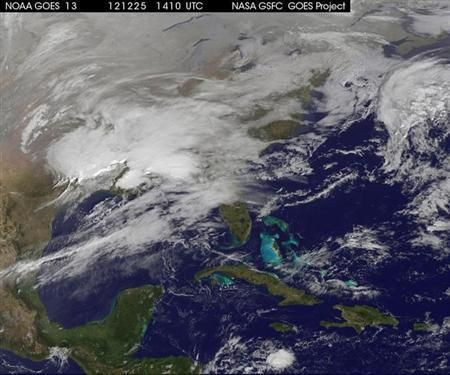Hurricane Season 2013: Atlantic Storms Get Named

The hurricane season begins just after Memorial Day Weekend, and the National Hurricane Center is ready with its storm names. The group released the 21 names that will be used for the season's Atlantic tropical storms: Andrea, Barry, Chantal, Dorian, Erin, Fernand, Gabrielle, Humberto, Ingrid, Jerry, Karen, Lorenzo, Melissa, Nestor, Olga, Pablo, Rebekah, Sebastien, Tanya, Van and Wendy, notes the Associated Press. (As storm system naming is based on regions, hurricanes in the Pacific have their own list of names.)
Covering the six-month hurricane season that begins June 1 and ends November 30, the naming system helps increase readiness and quickly identify storm systems. Hurricane names became especially important with the emergence of media as newspapers and television networks were able to use names such as Andrew, Sandy and Katrina to track the storm’s movements and alert the public.
The 2013 hurricane name list is one of six in rotation by the World Meteorological Organization. The lists get reused, so 2013’s list of names will be used in 2019, and 2014’s list will be the one used in 2008. Tropical storms first get named when peak wind speeds reach 39 mph, notes AP, while storms do not officially become hurricanes until wind speeds reach 74 mph.
National Oceanic and Atmospheric Administration, NOAA, is predicting an active Atlantic season with the Caribbean Sea, Gulf of Mexico and the North Atlantic regions expecting to get up to 20 storms. If there happen to be more storms than NOAA predicts, and more storms than the number of names, the WMO has a backup plan to name hurricanes. According to AP, if there are more than 21 storms, the Greek alphabet will be used. This happened most recently in 2005, when there were 27 storms and the six "extras" were named Alpha, Beta, Gamma, Delta, Epsilon and Zeta, notes AP.
But there are some names we won't see again for quite some time. Katrina, for example, would have been in the name mix again in 2011 and 2017, but it has been retired from usage, as is the policy of the WMO. According to the cyclone naming system guidelines, “If a storm is so deadly or costly that the future use of its name on a different storm would be inappropriate for reasons of sensitivity. If that occurs, then at an annual general meeting of the WMO Tropical Cyclone Committee, the offending name is stricken from the list and another name is selected to replace it.”
© Copyright IBTimes 2024. All rights reserved.






















